#manalysis
Text
akio knowing jack shit about astronomy but pretending to because it suggests a knowledge of the outside world, what lies beyond not just the gates of their school but the borders of their world, their planet. his cosmology is not one of curiosity; it is constructed, fabricated, and imposed. he controls the tools through which his students are allowed to imagine a possible future, a possible world beyond ohtori’s walls. he limits their flow of information, feeds them false information. he doesn’t care about the stars, he only cares about the illusion of stars, projecting them within the frame, teaching them to fear the real ones. just as he fears the real stars, of a thing that exists beyond his control, of ever leaving his cozy coffin, he imposes that worldview and that fear onto everyone else, because the less they know, the more afraid they are, the more he can impress them with his false knowledge, groom them with his conditional power, control them through his projected illusions.
he’s pretending to be an expert in a subject he clearly knows nothing about (like, you don’t need an astro degree to know that most of what he says is patently false) to impress a bunch of children. he is an adult who is still trapped in his illusion of an idealized childhood and would do anything to reclaim it including (but not limited to) torturing his sister who loved him. he wants the approval of children and to control children because he possesses all the maturity of one, riding endlessly on his carousel, trapped in the revolution of stasis rather than the revolution of change, of potential, to imagine a possible future, to imagine a possible world, to imagine a limitless universe. his soul has been calcified, his statue permanently figured in a pose of despair. because wouldn’t you despair if this was your sad, pathetic life? wouldn’t you be too embarassed to simply start over, to leave your coffin and accept a reality that does not center you and accommodate your every petty and cruel whim? the central truth about akio lies in the fact that he doesn’t actually care about the stars, and what that truly means: he’s pathetic, and he’s scared.
63 notes
·
View notes
Text
Is the flash-forward in Ao no Exorcist (chapters 139 & 140) relevant?
Is essentially the direction this post will take and the question it seeks to answer. This WILL contains spoilers for the manga, from chapter 110 to the current last update, chapter 148. You've been warned.
So! One thing I've noticed lately in the direction Aoex is taking is that it seems to be gearing up for a final arc.
Big confrontation against the Big Bad with all the allies gathered in a desperate last stand? The world at stake? Allies actually suffer losses and are subject to mortality?
Check, check, and check.
By all metrics, this looks like a final batttle, final arc material. Except! There are a bunch of things that make me say the manga is far from over. Mostly it's a dual thing. The big one is the flash-forward chapter. The other reason is how the content of those two chapters is linked intrinsically to everything else.
And now another warning. All of this is speculation and theorizing. Take it with a grain of salt, don't get too hyped up. I could be wrong and reading too much into it. So keep that in mind.
That said, in the aforementioned chapters, halfway through chapter 139 and two-thirds of chapter 140, we see the future in a vision. More precisely, Mephisto is given a vision.
The funny thing with Mephisto is that he already broke the fourth wall once, in that one chapter I can't remember for the life of me. This, for me, gives credit to the flash-forward right away. Beyond the fact that its existence is a deliberate choice made by Katou of course.
Besides, since we're on the topics of choice, there are many elements present in those two chapters that tell me all of this was thought of in advance. Because those elements are referenced directly or in a roundabout way in the previous or following chapters. Here's my list:
Shima's dream of becoming an idol:
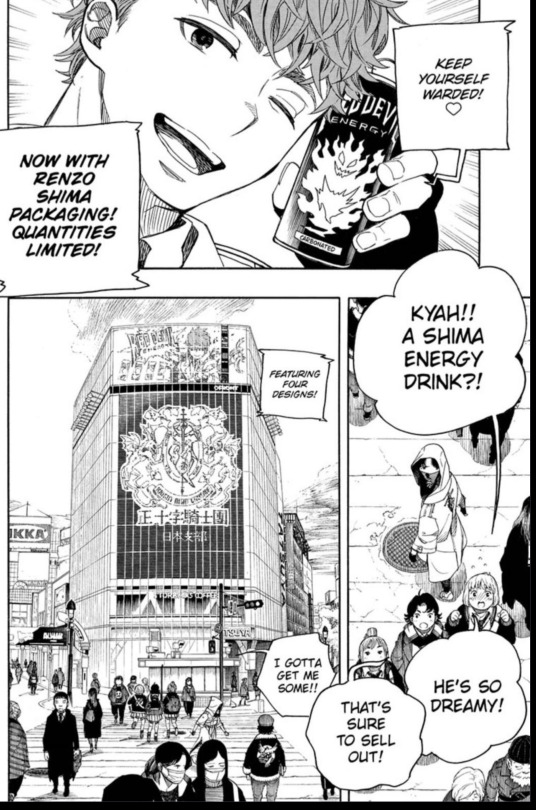
Chapter 139 page 27
And here is him saying it outright when asked about what they'd do after the battle in their story's present.

Chapter 144 page 9
Rin's powers:
The fun thing Kato Kazue has always done was color code Rin's power for our convenience, especially lately. In the recent fight with Yukio, he makes mention of Rin's appearance and how the way his brother looked then, bright hair and visible demon's core, meant that he was unstable. And later, Rin said that he tamed his demon's side.

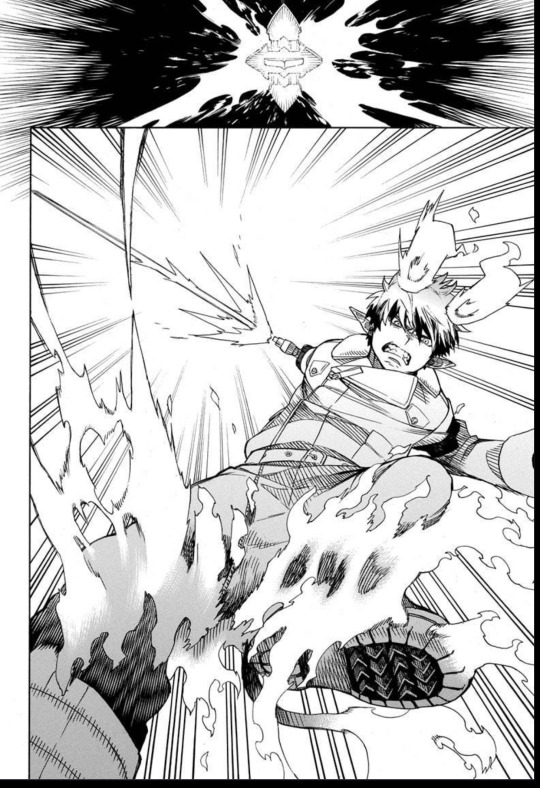
Chapter 132 pages 20-21
BOOM. TRANSFORMATION
And as it happens, in the flash-forward there are also transformations and what's special about those is that he doesn't need to sheath and unsheath Kurikara to make them happen.
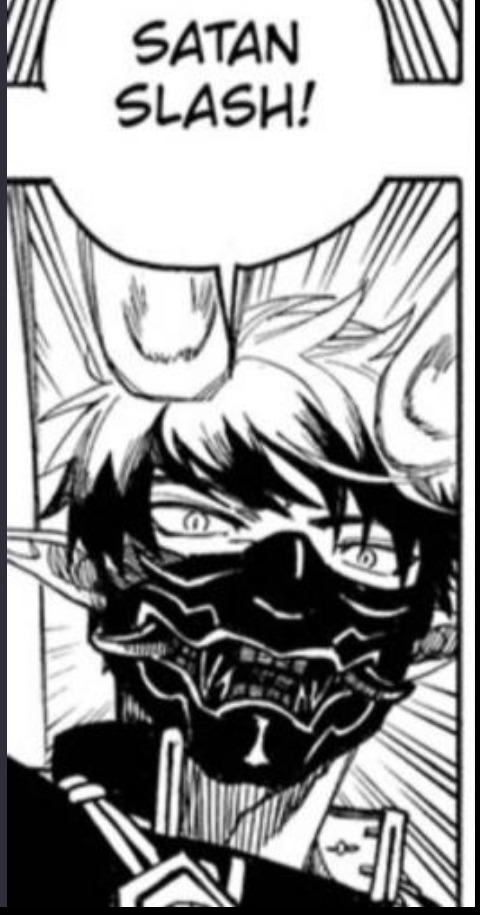
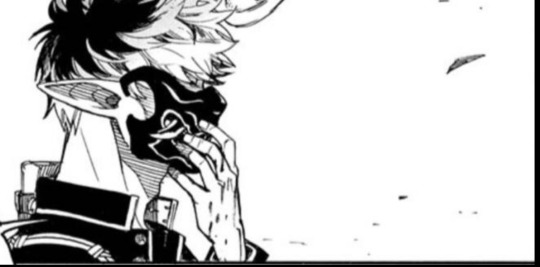
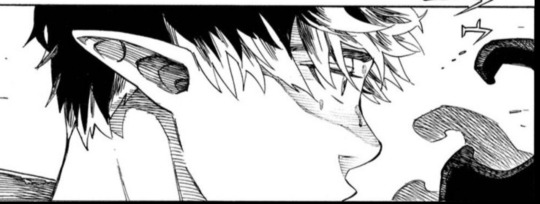

Chapter 140, pages 9, 16 and 18
But that is before and during the flash-forward. What about closer to the story 'present'?
Here is Yukio reaching out to Rin so his big brother can talk about his problems if he wants to. Because he learned his lesson about bottling up and trying to face everything on his lonesome. Isn't awesome and cooing worthy?
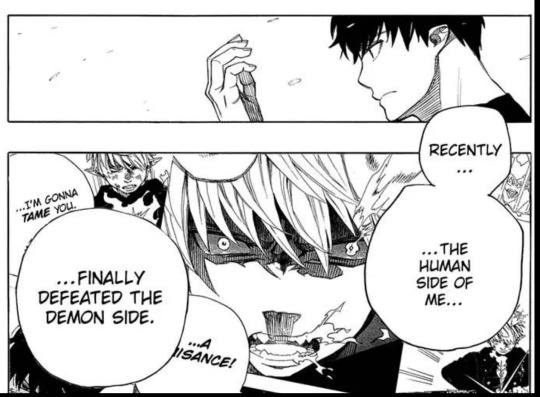

Anyways, Rin gives us access to his inner thoughts and tell us how he offered to make peace with Satan and was harshly rejected. But the whys of this are especially important.
Here he is, on the eve of their final battle, asking himself if this is the right way. Not outright rejecting Satan's words. Still on his journey of acceptance of his heritage.
The stages we've seen so far are; denial, acknowledgement, looking at the whys and hows of his nature by witnessing the past, trying to repress and then tame his demonic self by exerting control. The missing parts for me are understanding and acceptance. There is a space left for it in the 'present' and in the flash-forward, our vision of the future, he seems to have gone through those stages and be able to use his powers at will, finally at peace with himself.
Chapter 143 pages 27-28
The Paladin condition:
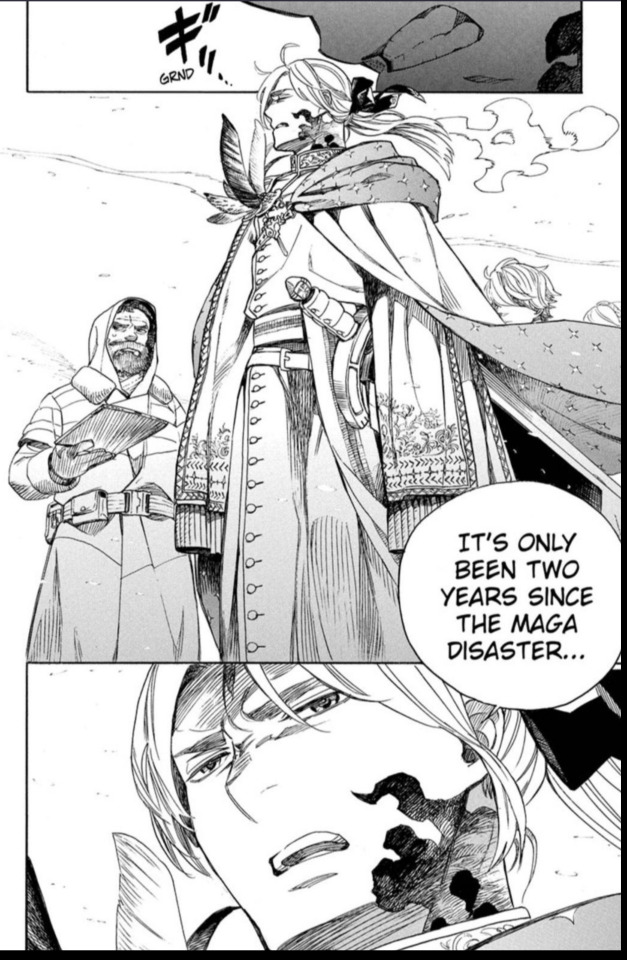
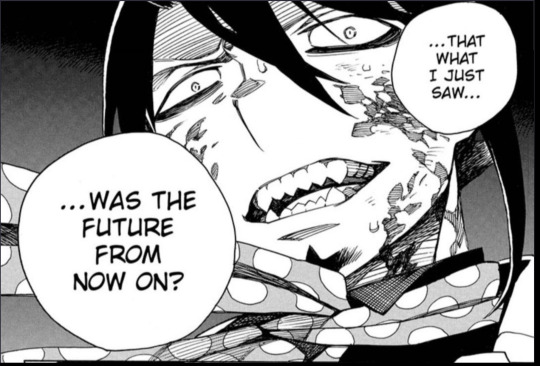
Chapter 139 page 21 & chapter 140 page 31
The exact same form of damage that one of the Ba'al's host bodies incurs through rapid cell regeneration/degeneration. Also, because I don't think Arthur's status as the only Lucifer's clone & prospective host to survive was put in here just to give him an existential crisis he refuses to engage with.
Speaking of the Ba'al's hosts though.
Astharoth's incarnation:
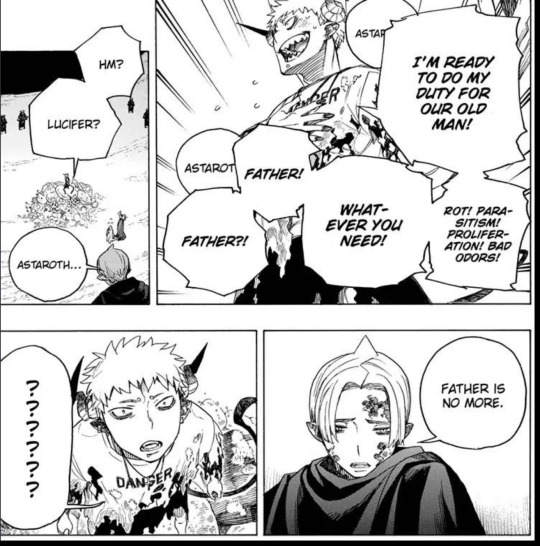

Chapter 144 pages 25 & 28
As funny as those panels are, and they are funny, I don't think it was done solely for the bit. If they were, why bother bringing back the guy who can theoretically be accredited with kicking off the whole plot by forcing Rin's first transformation?
Manga likes being self-referential and it's arguably a better idea than crafting a new guy out of whole cloth, but then why bother giving us these little glimpses into the individuals' attitudes, goals, wishes, and dreams of the Ba'al in the eleventh hour?
Katou Kazue has taught us to expect better.
And now that I've mentioned expectations...
Shiemi's uncle:


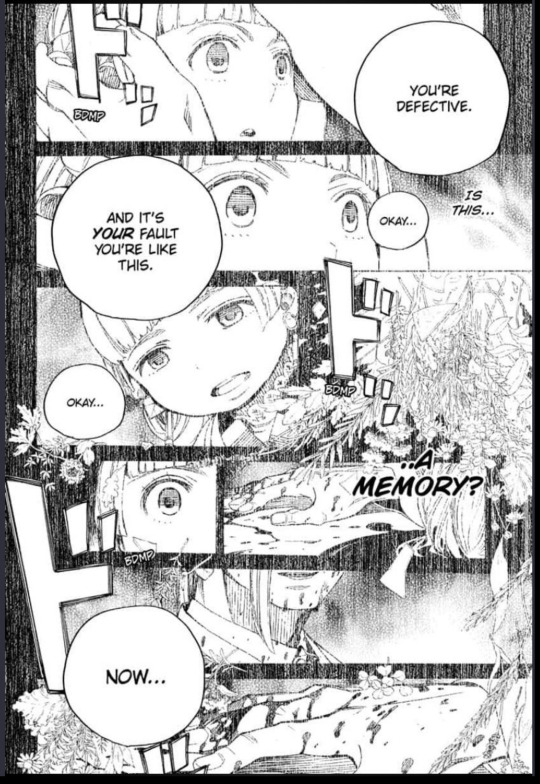
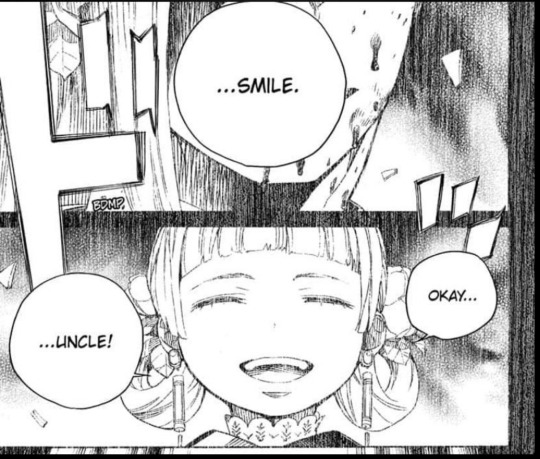
Chapter 114 pages 8-9 and chapter 131 pages 11-12
So, what's up with this guy? He scares Shiemi on an instinctual level when she's not easily frightened, and with the bloody hand and the way we see him smile in Shiemi's forgotten repressed memories, my personal bet is that he killed someone, she witnessed it and he told her to forget or made her forget. Also, has ambitions to shape her to his will, given the nature and tone of their short conversation.
Something else that's also important with Shiemi's uncle, he's the one who purposefully lied to Arthur about his origins and exudes absolutely creepy (controlling) vibes in general.
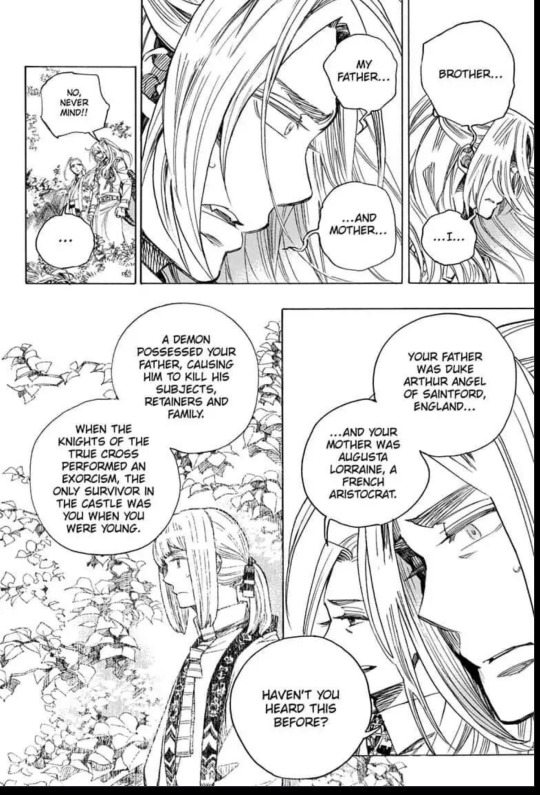
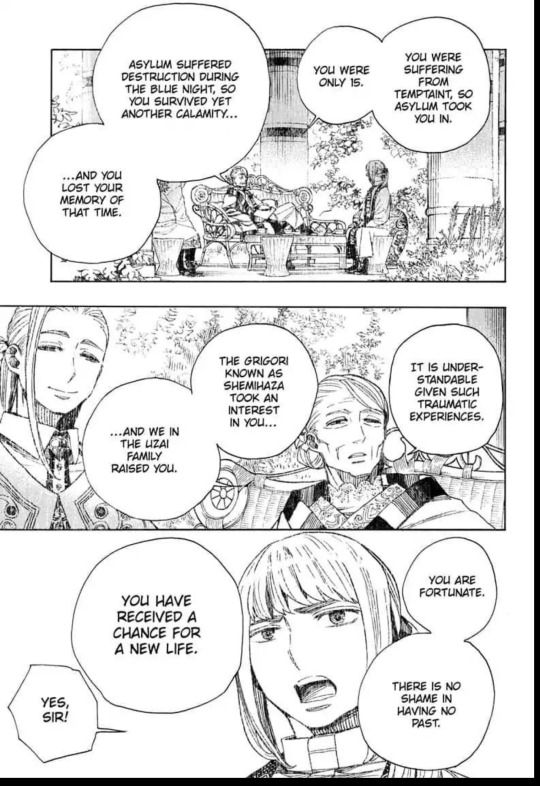
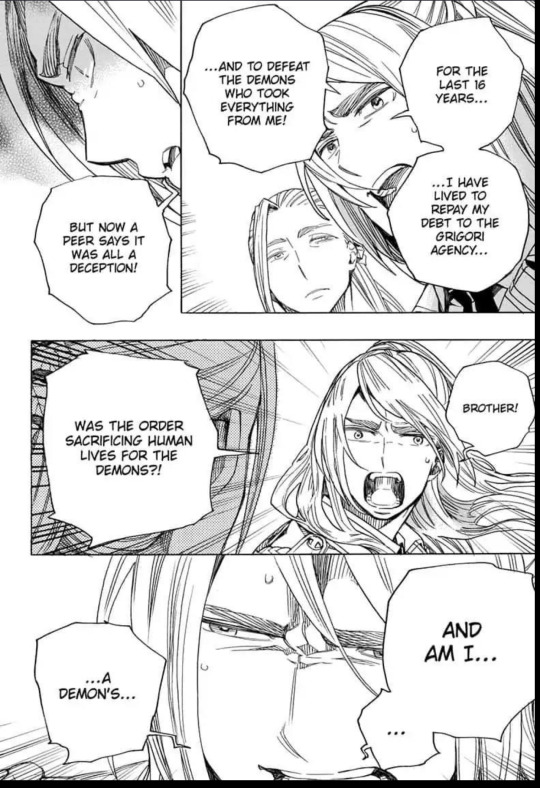

Chapter 111 pages 14-17
The Uzai family, attendants of Shemihaza, raised him once he got out of Section 13 Asylum due to Shemihaza's interest in him. That is what he's told at least. But... he's already been lied to about his past.
At the time it is very possible that Hilkiah was following the current Shemihaza's lead and keeping mum on exactly what Section 13 was or how it connected to the True Cross Order.
What matters in this section is the story's present. When presented with an opportunity to tell the truth, Jeremiah reinforced the lie.
Arthur considers him family, calls him brother. They're close enough that he expresses his deepest and most ruinous doubts to Jeremiah, the question that would make him reconsider his entire existence.
The question is, why would Jeremiah lie to Arthur?
I think the reason is that Jeremiah was assigned to stay at Lucifer's side by his uncle (despite Shemihaza's protests) to keep an eye on Lucifer and saw all of this:
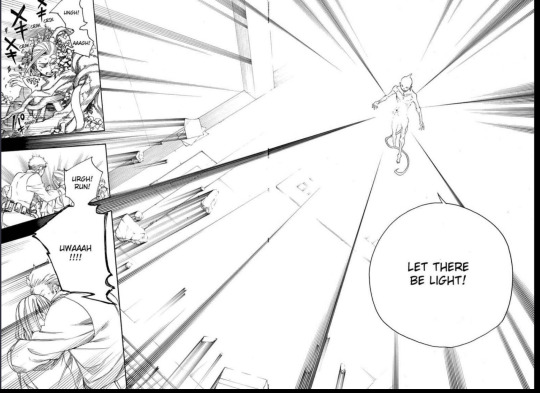
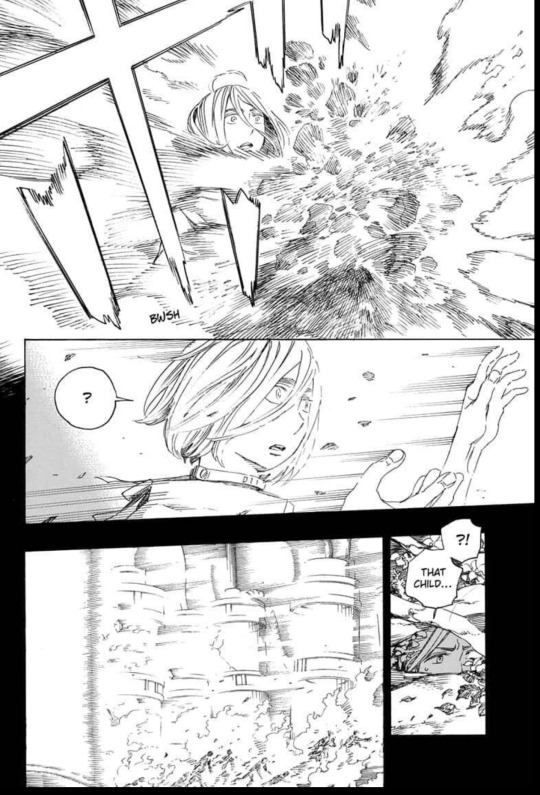
Chapter 118 pages 20, 22-23
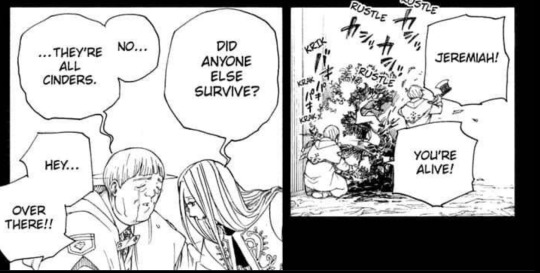

Chapter 119 pages 15-16
[Not included (I'm fighting with the image limit) but relevant. Before Lucifer zapped them all to cinders there was a first flash of light that mesmerized Arthur. He walked to it, saying, "It shines like something special... I want to be like that too." When the possibility he could die heading toward the light (ironic, I've just realized) is raised, teenage Arthur responds, "It's okay. If I die I can be part of it."]
So what Jeremiah saw is this; a child unharmed among corpses reduced to cinders, despite withstanding the full intensity of a lethal attack from Lucifer itself. The success of Section 13's research, a bargaining chip in the future for when Lucifer comes back.
And the reason I think he lied was to keep that bargaining chip nice and snug for eventual possession by Lucifer. Because demons feast on Exorcists' doubts and struggles. And what's more offputting and likely to put someone off kilter than touching upon their very identity?
Uncharitable? Maybe.
But Arthur is drawn into a fight by the guy who created Satan's host body, baited into getting close enough to be injected with something, and the next (and only) time we see him after that is during the flash-forward where he shows signs of advanced degradation.
This takes us to the final point I wanted to make.
The Looks:
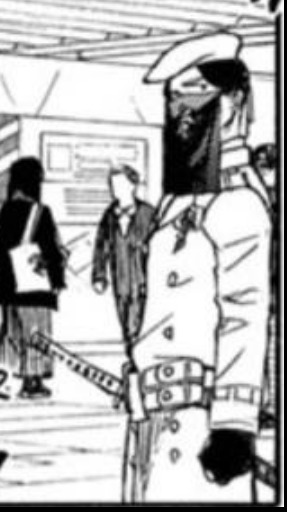
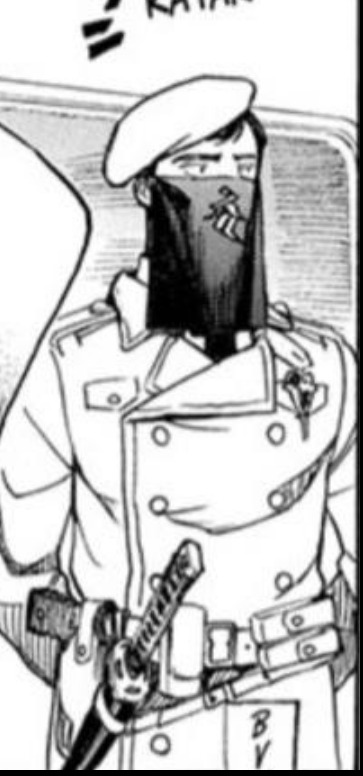
Chapter 139 page 28
They're the law enforcement of the dystopian future which tracks its citizens' location and schedule; that Paku is a victim of and which Rin works against, so what? What's the only other place we see the extras wear berets alongside their uniform?

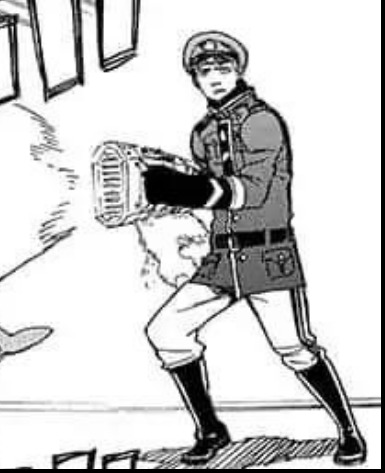
Chapter 110 pages 5-6
And which other faction wears white among the True Cross Order than the Grigori and more precisely, Shehimiza's faction? No one. Manga is a visual way of doing storytelling and this is why I think the visual coding is important.
Plus, Katou Kazue did go through the pain of giving the True Cross Order's uniforms. Uniforms that very visibly change design in that future we're allowed to glimpse, so to me, it's not a coincidence.
Also, I think, (this part is purely speculation) that in the flash-forward Jeremiah and his faction seized power, and allied with Lucifer, took control of the True Cross Order. Hence why the organization is so repressive and controlling, to the point that Rin (who didn't kill homicidal zombies because he's on the side of humans) actually kills one of their... chief operatives? Someone who represents a legion, presumably, someone important enough to be hunted down.
Previous paragraph aside, none of this was put in there on a whim or at random. In fact, the flash-forward is surprisingly cohesive, plot and characterization-wise (I'll definitely have to do an in-depth analysis of it to do it justice) and I'm of the firm belief that it is a teaser of what's to come.
Personally, and this one is a gut feeling only. I think that the current arc is either: the penultimate arc or the midway point of the manga.
30 notes
·
View notes
Text
THOUGHTS ON NEWEST RICK & MORTY (SEASON 3 EPISODE 3)
I think that this is the entire point of the episode -- it's not trying to develop its characters as much as other series are, because they are trying to make Rick and Beth as realistic as possible. Like normal human beings, sometimes they just want to put off their problems and just carry on with what they usually do (1. Rick literally turning himself into a pickle so that he doesn't have to go to therapy/talk through his feelings and then embarking on yet another crazy adventure, 2. Beth refusing to acknowledge the toxicity of her and her father's relationship, as opposed to 3. Dr. Wong actually brushing her teeth/wiping her ass). This episode to me, was probably one of the most brilliant R&M episodes ever made: it shows how there are two parts of the mind -- logic and emotion, and how focusing on only one and not the other is ultimately very destructive. I liked how the show emphasized how detached Rick is with his emotions and his family, so he delves into his experiments and his science (Literally harvesting the neurons/the brains/the synapses of cockroaches and rats to reach his goal -- the logical side of his mind) rather than facing his feelings (Like when he talked about how love is just a word people use to describe fondness over time and how he has infinite daughters, so why bother trying to mend his relationship with just one?).Continuing my thoughts, I think the producers specifically chose to make Rick a pickle as a play on words with being a "vegetable". In medical terms, when someone is in a vegetative state, their brains are literally nonfunctional. He decided to transform into a vegetable (Aka, turn off his brain) so that he doesn't have to face the other part of his mind -- his emotions. This interpretation aside, I also think Rick's perspective on his situation is cynical but pragmatic at the same time. He doesn't feel the need to figure out his deteriorating relationship with Beth or his grandkids because of the infinite amount of timelines he has.
#rickandmorty#r&m#r&mseason3#rickandmortys3#rick#morty#summer#dr.wong#picklerick#rickpickle#rickle#newepisode#interpretation#r&minterpretation#r&manalysis
17 notes
·
View notes
Text
Return to Night
((Set roughly two or three months following the Battle for the Undercity. No spoilers.))
“Master Nethermoon”
The doctor clears his throat.
A lucid jolt hits Ouron back to the present. Across the fine, dark desk an elf so junior it offended Ouron how important he was looks back with false concern.
“Trouble focusing?” the bratty snide little nothing says to him.
“I’m very present, thank you, merely much on my mind. As you can assume,” Ouron says with hands folded in his lap. The feel of skin on skin, especially there, still felt strange. No adjustors, no finely-crafted compensators, just flesh and bone. His flesh. The little tendons-
“Master Nethermoon?”
Ouron clears his throat, noting the doctor’s silltop plant aging with little less grace than himself.
“Please continue,” Ouron says to nobody.
“It was at great expense and as recompense for The Sunguard’s service that I reviewed a mister...Silversword’s request to see your file. I hope you realize that-”
“And to myself, of course,” Ouron interrupts.
Framed by two goliath reams of paperwork the doctor appears ready to break his oath of service.
“Pardon?”
“As recompense to The Sunguard, and to myself,” Ouron completes.
Doctor Jel’arae Ivyheart considers his debts private and public for a moment, and finds nothing for the swelling raisin of an elf in front of him. The two contend to stare at the plate bearing the doctor’s name in silence while the room cools.
“Go on,” says Ouron.
Having quite enough Doctor Ivyheart, head of the Crown Institute of Medical Magecraft reads the carefully constructed, appropriate, and politely worded document all his bedside manner of three-hundred odd years gave him. Speaking in one breath, loudly, and against the petty injections of “Hmm,” intentional coughs, and nitpickings of pronunciations.
“Master Nethermoon,” he reads:
“After the best attempt to discern your current state, the Institute has prepared a scenario that given your history we believe is plausible within current acceptable medical margins. It is the Institute’s belief at this time that your repeated induced stases and exposure to Elementium-5515 (see cited said isotope’s catalogued side-effects and your history of warnings in repeated exposure in the attached file) created a bizarre situation in which your body rapidly shed its own stores of mana, causing your physical structure to deteriorate.This accounts for the severity of your previous misdiagnosed mana addiction, and explains your ability to retain higher cognitive function despite appearing as Starved, and the phenomenon described where rare cases of oversaturation induced a medical homeostasis.
It is the Institute’s belief that, following the complete depletion of mana from your body during the incident in question-” the doctor pauses to look up at Ouron’s glowering face “-that the interference of your chronic Manalysis ceased to have an available means to perpetuate itself. The triage care you experienced following your trauma, including the magical means of healing and rapid mana transfusion, likely caused the violent reaction producing your hemmorage.
It is therefore, at this time, that while the Institute congratulates you in overcoming your illness, and in your renewed vitality, that we regretfully posit the belief that in all likelihood the affected areas of reasoning, spellcraft, and your previously described areas of concern will be lifelong.
The Institute would like to-”
The doctor’s groan follows Ouron out the door as he walks, cane tapping syncopated to his irritated stride. The grout of the tiles below him whisk by in pairs of two as he rounds the corner mumbling, huffing. On reflex his mind turns first to the memories of many letters, the failings of many doctors of the past. Each of them incompetent to the last; each maintaining the cornerstone of their profession. Bad news, disappointment, and hold-holding mollycoddling was all they ever offered.
Past protesting nurses, into the light of the street he bursts with a fury of robe and rod, tapping the end of his cane to the ground in his signature bluster.
But there is no sound to greet him but the streetside chatter. The singing of city birds, the shouts of workers busy with their labor
There is no chime, no “Ping!” from just above his eartips. All above his head is sky and wind.
There is no glow, no flash of light or sweeping beacon. Sun above looks on him and all the rest as plain as ever, putting shadows where they must be.
No magic.
The nausea hits him all the same. His stomach turns with his eyes to the bit of benign branch in his hand; a stupid and ugly bit of work. Folksy. His hands grip about the wood and feel the slobbish grain foul his hands with blisters too small to exist. Stupid-useless, thinking to himself.
The glass door to the Institute shatters as a piece of broken wood flies through the delicate finely frosted etchings to the information desk. Ouron’s angry eyes, swelling with life and anger, look about the frame.
Do it yourself.
But when he reaches out to find the spell it is not there. The fine pieces of glass float tidily back into place as he struggles to find the words.
Like the frame remembers the door, like the hole remembers the ground-he feels the ghost of it calling from nothing. Words lost in a gossiping crowd, words so loud they filled his mind with horrible powerful choirs every second-every day. He calls to them once again, they are there! They are there!
5 notes
·
View notes
Text
Zelo:
when I first saw him I thought he was this cutie pie I just I don't know his face was extremely cute. then i searched him up and found out that he was from BAP, maknae and tallest.
I see him in MVs first without seeing his behind-the-scenes self, and I thought, from his MVs, that he might be this little cheeky kid who just gives off the feel that he talks a lot in real life (kinda like Baekhyun, except Baek looked quieter in MVs but talked a lot in real life). I immediately assumed that his really different hairstyles (srsly I saw him in an afro and I was like srsly srsly zelo bby) that he was probably the life of the party and was a bratty (but one that has a lot of aegyo) maknae. i was okay with that, and i didn't pay too much attention to it, because it honestly seemed like he was the loud, outgoing type of BAP.
But then I started watching some of the variety shows, like Weekly Idol and I even watched Ep 1 and half of Ep 2 of BAP Camp today (140407). He's not like that at all. He's not stuck up, bratty, childish, or loud at all. He's the exact opposite. In fact, it almost seems to me like he's the most mature out of BAP I'm not even kidding. Maybe I haven't known BAP long enough to judge, but these are my assumptions for now.
In Weekly Idol, he lets his hyungs talk and he doesn't say anything himself. I think he's a little shy just about everywhere, and is definitely the quietest out of all of BAP. From what I see, Youngjae and Daehyun and possibly Himchan are the life of the party, and really I actually thought they were the mature ones from the first time I saw them in MVs. I cannot believe that they are more childish than Zelo it is hilarious.
What really makes me confused is in episode 2 of BAP camp, while they were playing mud soccer (I only kinda got up to there because then they started sharing chocolate or something and they were nearly kissing and my mum thought i was watching some gay flick wth mum), every time Himchan or Jongup got a goal, they go to each other and they completely leave Zelo out. Then I started noticing that Zelo is actually left out in a lot of their activities, and that's probably why he's so quiet. Or maybe it's because he's so quiet that no one bothers with him? Still, it makes me feel slightly angry. Just that, he's the maknae here, and no one pays attention to him. It's a soccer game, and you're a team, so come on guys, at least go and high five all of your teammates and celebrate with them. Don't leave one out even if he's the member you're least closest to.
But I think it's fairly obvious that Youngjae and Daehyun are besties, and Himchan and Jongup are rather close with one another, but I'm not too sure yet. Still, that's no reason to leave someone out like that. I'm still scarred for life and I hope that my assumptions are wrong.
Then in Weekly Idol, again he's the quiet one that doesn't say anything. I'm glad that he bows the most properly out of all 6 of them though (considering Sehun doesn't bow properly sometimes and I cringe every time I see it - I'm kinda hoping it's because he cannot bow that low and not because he doesn't want to bow that low).
What makes me smile though is that in Weekly Idol, the most recent one I think it was 140305 idek but I only watched passed the random dance, Zelo always seems to be the first to know where to go and what parts he does. either he's extremely good at remembering and using that memory or he just worked really hard at his parts. Then later, every time the cameras are on him, you can see that he's putting his all in it and his dancing just awes me compared to everyone else's - it's like he's trying his hardest even though it's not a proper performance. i'm just simply speechless at how quick and smooth his moves were - i didn't know he was that good at dancing.
then when they finished their dance and youngjae got caught, everyone else but zelo was cheering because they were the ones who didn't get caught. despite being the maknae, zelo's still, in my opinion, either the most mature or the least lively. daehyun's definitely the liveliest, next would probably be youngjae, then himchan, jongup, youngguk and then zelo. i don't even know man how can the maknae be so ... calm about everything? XD
this is the part where i decided zelo is definitely definitely my bias in bap. he had always stood out to me, but when i saw daehyun in the mvs i thought he was really really charming, then there comes yongguk's adorable personality and jongup's sweet sweet composure, then youngjae's handsome face and himchan's hilarious outbursts. but definitely, definitely this is what touched me.
when youngjae got hit by the plastic hammer really hard, you could see that jongup (i think i'm not too sure), daehyun and yongguk's faces light up in something between glee and surprise. himchan was just stunned and zelo was horrified. you see like the older three start idk looking to each other as they laugh at youngjae's misery and you see jongup and zelo rushing to him to ask him if he was okay. even after that jongup had stopped and gone to join the laughing crowd and zelo was still there, holding youngjae's arm slightly.
isn't that the sweetest thing? seriously. he's the maknae - he wouldn't really be judged if he was acting bratty (he would but not as much) or cheeky or mischievous, but he's none of that, at least not from what i've seen. sure, i prefer livelier guys, but really zelo is just adorable in his own way. he's just so quiet and calm and so different than what i thought he would be. he also silently works hard and even though i REALLY HAVEN'T GOTTEN TO KNOW HIM YET, i still don't understand why he's the one most left out in BAP. maybe because he's so quiet? or so young? idek.
AND THEY'RE COMING TO WHERE I LIVE SOON ENOUGH LEGIT I REALLY KINDA WANT TO GO BUT I ALSO WANT TO SAVE UP FOR THE MOMENT WHEN EXO COMES (which is very unlikely but i'm risking it). And i really hope i'm not missing anything seriously. damn i want a ticket ;;
2 notes
·
View notes
Text
that one post about the christian homophobe who loved utena “aside from all that gay shit” is really funny but i do actually see a quite common sentiment being repeated by casual viewers which is that it’s a great show “aside from all that incest” and like. okay yeah i can get finding depictions of incest uncomfortable in a way that is far less excusable wrt like. lesbians, but if you’re not engaging with the incest in rgu by acknowledging how it functions in the narrative and what its purpose is thematically then there is simply a massive lacuna missing from your ultimate interpretation of this show, because incest is in fact crucial to this narrative and eschewing it for your comfort means you’ve missed the point.
it’s giving “i’m gonna act like nanami never drowned that cat because she’s a good character and i like her otherwise” (another take i’ve seen). and just. NO!!!!! sit with that discomfort!!!!! allow the horrors and grotesque implications of what you have just witnessed to linger, interrogate your own emotional response, the gut feelings of abjection and disgust, dissect those implications. the incest isn’t an accident, or an unfortunate addition to an otherwise great piece of art. it’s crucial to the fabric of this very deliberately woven tapestry. and you have a moral and intellectual obligation to recognize that, to acknowledge the extent of the violence that is being presented and critiqued, both in how it is facilitated and what logic enables its systems of exploitation and abuse. you cannot avert your eyes from anthy’s haunted gaze.
498 notes
·
View notes
Text
while it’s true that all gender configurations do the “rose bride sword pull,” and thus drawing a m/m or even m/f couple in that pose isn’t necessarily displaying a lack of fidelity to the show, it nonetheless often feels highly reductive when it’s framed purely romantically. like yeah saionji can pull touga’s sword, but touga is also an abuse victim, and their relationship is hardly a pure, uncomplicated romance. the rococo aesthetics of the show deliberately obfuscate the urgently violent underbelly that is gradually exposed via a tapestry of intentionally beautiful symbols. the sword pull is one of many examples of the violence underscoring romantic relationships across the show, best exemplified throughout the black rose arc, but nonetheless constantly emphasized throughout the final arc, especially when you learn where the swords come from and what they signify. so it’s not even that it would be more accurate to “only draw lesbians” in the sword pull pose, but that most romantic relationships are simply not framed with the nuance and implicit violence that utena establishes. saionji can pull a sword from touga’s heart, certainly, but if you transposed that onto, say, troy and abed from community (they’re the only “yaoi ship” i can think of), that would be weird! but that would also be equally true of like, korrasami or whatever.
#im so sorry to troy and abed for even implicitly likening them to touga and saionji 😭😭😭 they don’t deserve that 😭😭😭😭#anthy#touga#saionji#i guess .?#u#manalysis#analysis
466 notes
·
View notes
Text
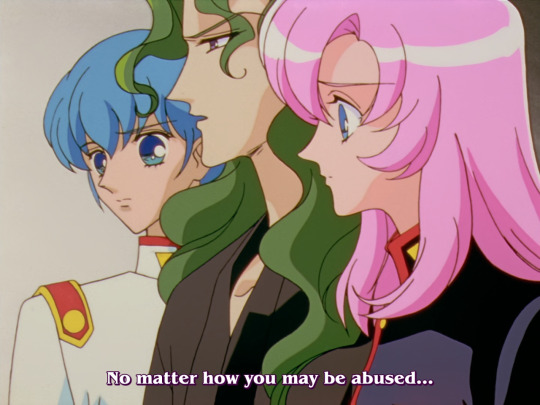


yet another moment where saionji says something incredibly trenchant and insightful only to be completely dismissed due to the ridiculous framing and the general cringiness that pervades everything he says and does (eg, pointing out that the castle is a trick of the light, announcing that they must shed the coffins end of the world has prepared for them, etc etc). obviously in this instance, he is both saying something that is proven correct throughout the show via a myriad of dynamics, but is also shown to be a precept that is teleologically challenged and rejected by anthy’s final choice.
upon a first viewing, one might assume saionji himself is talking about anthy here, whether by presumptuously assuming that she loves him despite his abuse, or claiming that her rejection of him does not lessen his love for her. either way, he seems totally delusional and moronic. i can only assume that utena, who has even less information than we do regarding saionji’s true feelings, assumes that he is talking about anthy, and thus dismisses him out of hand for being a violent idiot. and rightfully so. but also, he’s clearly not talking about anthy, even if he may think he is (or at least would claim that he was if questioned). and this statement is truly definitional to his relationship to touga, whom he resents, envies, and maybe even loathes, but whom he cannot seem to ever actually abandon.
even when he’s given the chance to start fresh, he returns to ohtori (and in this case you can say that it’s because he has nowhere to go, no family, the outside world is scary, ohtori is all he knows, he felt he had no other choice… but this was also true of anthy, and she eventually found the courage to leave! it’s very very hard, but it’s not impossible, which is the point). even as he vocally condemns akio’s system, he nonetheless participates in it, albeit reluctantly, for touga. he is freer, healthier, and kinder in wakaba’s dorm, but he is also deeply unhappy. which isn’t to say that he ever seems happy (at least, not after losing the rose bride), but his unhappiness in “wakaba flourishing” is that of depression, whereas his unhappiness around touga is that of resentment. he’s rightfully angry over constantly being mistreated, but at least he’s not lost. he has a purpose. even if it’s just the purpose of receiving abuse and putting up a futile fight, it’s a role he can play with the only person who has ever truly mattered to him. it’s all he knows; it’s the closest thing he has to real love. and so he stays.
nanami is in a very similar situation as saionji is. they both idealize a version of touga who never really existed, and cling to him despite his blatant mistreatment of them because he is the only person who has ever shown them true affection in their entire lives. he manipulates them, makes a laughingstock of them, facilitates and participates in sexually abusing them, but also makes sure that they are too dependent on him to leave them. nanami is even more blatant in illustrating this idea than saionji is, as for most of the show, she does not even resist against touga like saionji does, rather she purely venerates and worships him, to the point of parody. he is a terrible brother to her, but in such a way that makes it seem like he’s actually a good brother to an obnoxious, ridiculous sister. he is actively grooming her, and she has nowhere to run, because he has fashioned himself her entire world. she cannot fathom a world beyond his limits, her very own personal end of the world.
it’s somewhat unclear whether touga thinks that controlling saionji and nanami is necessary to keeping them around, or whether he only wants them around because he enjoys assuming control over others. it’s probably a mix of both. he probably does hold some affection for them, but cannot conceive of a way to keep them as close to him as he would like without exploiting them, because he believes that true friendship is for fools and true love is impossible. to touga, if every relationship must be imbalanced in some way, then he at least wants to be the one with the power in his deepest relationships, unaware (or at least, willfully ignorant) of the fact that by corrupting and perverting their dynamics, he is slowly tainting their naive childhood love and affection that drew them to him in the first place. so in touga’s case, he inverts saionji’s logic to refigure it as “love can only be facilitated through abuse, no one will truly show you love unless they have to (through exploitation).” it’s the logic of someone who sees the world through an almost 2D framework of abuse, exploitation, transaction, and control. it’s the logic of someone desperately sad and desperately cynical. nanami is very wise (and brave) to ultimately reject him/it, even though it, too, is all she knows.
tsuwabuki complicates the nanami/touga dynamic by aspiring to inhabit both their roles simultaneously, and so he allows himself to be subjected to nanami’s exploitation while simultaneously subjecting her to violence. he is happy to be abused by nanami not because he loves her per se, but because their abuse is mutual. shiori and juri have a similar dynamic, wherein they are both at fault in different ways, both attempt to avoid the other (physically and psychologically) and yet constantly collide like magnets. however, the i would argue that the abuse they face is largely systemic, and their behaviors are primarily a symptom of their internalized homophobia rather than overt malice (even though shiori may pretend otherwise). miki and kozue’s tension is also mutual. they both harm the other despite loving them deeply. because love is not a bandaid that revolves all pain, misunderstanding, and miscommunication. see: the utena and anthy ledge scene.
finally, i think this quote is actually most powerful when figuring it through the lens of utena, anthy, and akio. of course, akio has fostered a dependency in anthy much like touga has with nanami, and so she does not know how to leave him despite being in incredible pain at his hand. but she is not “happy,” as saionji puts it. she is the most miserable girl in the world. she doesn’t love akio as much as she loves the memory of him, the idea of dios (which is of course also true for nanami and saionji re: touga, arguably also true for juri re: shiori, miki re: kozue, etc etc) — but anthy needs akio. or at least, akio has convinced her that she does. he is end of the world, she cannot envision a life beyond his imposed limits.
but i actually find it more interesting with regards to utena and akio. i don’t think at any point in the show, utena ever actually has real, romantic feelings for akio. i think that she is terrified of him, and in her desperate feelings of trapped helplessness as he ensnares her, she convinces herself that those heart palpitations, startled movements, shocks and thrills she feels in her presence is the emotional response not of fear, but of affection. but we know that in anthy’s presence, she doesn’t feel afraid, she feels calm, relaxed, happy. being with anthy isn’t wildly exciting, constantly requiring rationalizations to explain away the dread and internal rejection she feels towards akio’s advances. being with anthy feels like coming home. and it’s why she is initially so happy to be accepted into anthy’s family, to have a big brother like akio, to live under their roof. in utena’s naive, hopeful mind, she is joining anthy’s family in the most innocent possible sense. and she endures it, the grooming, the abuse, the rape, the end of the world; she fights til her very last breath, because she is in love. no matter how [utena] may be abused (by akio), she’s always happy to be near the one she loves (anthy).
#remind me to write an analysis on the moniker ‘end of the world’ next#bc i only rly allude to that here#id in alt text#u#analysis#manalysis#saionji#utena#touga#anthy#akio#nanami#miki#kozue#juri#shiori#tsuwabuki#dios#utenanthy
405 notes
·
View notes
Text
i love miki and kozue so much because they are like a perfect distillation of the show’s themes in its purest form. miki is literally the one to coin the term “sunlit garden” as a central motif/narrative device/mechanic illustrative of theme throughout the show. the piece plays during utena’s memories of the prince. the sunlit garden has since gone to seed. kozue likens herself to a wild animal, dehumanizing herself through the logic of animalism while simultaneously refusing to be classified as livestock (nanami and anthy both get barn sequences; kozue fancies herself liberated). she still refers to miki as her big brother even though they are literally twins. their desires are not literally incestuous, but rather figuratively incestuous; incestuous only insofar as it is a tool used to the reify the sanctity of the nuclear family. their parents are divorced. they used to play piano together, but kozue was merely flitting her hands over the keys while miki assumed she was not only a genuine participant, but the true virtuoso between them. kozue sees sex in general as a vehicle of control, and that in participating in her own exploitation willingly, she can in fact liberate herself, and even gain the power to exploit others. miki views sex as something to be feared, a phenomenon relegated to the world of adults, and that if he simply ignores it, its consequences cannot hurt him. kozue is constantly impressing the frequency and depravity of her sex life to miki, while simultaneously protecting him from the consequences of this adult weapon being used against him. akio gets to her, and suddenly she no longer protects him, but rather encourages it. he is a prince, and she is a witch, a rose bride. they both play their roles. they are twins. yin and yang, light and dark, two sides of a mirror, a window that frames a false mythos. their commitment to their seemingly opposed yet shared delusion exposes its inherent fallacy through illustrating it so plainly. miki wants her to regress, kozue wants him to grow up. they both want to go back to that sunlit garden, but stasis is impossible. eternity is an illusion. their garden has gone to seed.
#I love these little freaks why does no one seem to care abt them as much as i do :(#kozue#miki#manalysis#u#analysis#fun fact. i first learned the phrase ‘gone to seed’ from reading hamlet#somehow i still remember that
245 notes
·
View notes
Text
the fact that saionji is dismissed even within his own episodes, constantly undermined through comedy and treated as a figure of derision and scorn, is actually fascinating when considering how insightful he can be. but all his moments of insight are framed in a way that undercuts his meaning and making him the subject of mockery (by both the characters and the audience). because, if saionji was taken more seriously by the narrative, that would fundamentally destabilize akio’s framework, so saionji is discarded and trivialized not because he is so obviously and gratuitously flawed (although he clearly is), but for his virtues, his insights, his ability to see through the bullshit even as he nonetheless so desperately enmeshes himself in it.
nanami also threatens akio’s framework and is reduced to comedy, but she’s nonetheless presented as a far more tragic and sympathetic figure. but saionji is actually in a very similar position, hence also being tossed around and denigrated and turned into animals and so on. within the narrative, utena is framed as this noble, beloved hero, not necessarily because she is such a flawless and perfect person, but because she is being groomed by the narrator who preys on her naïveté. saionji is the opposite side of the coin. they are foils, and in many ways quite similar, but saionji is immediately established as a villain, and then quite quickly a loser and a clown. and i’m not saying that he isn’t those things, but that he is framed so uncharitably for a reason. because he is, fundamentally, a cynic, and akio’s world is powered by grand yet hollow ideals.
what can we do with someone who is so antithetical to our own goals that they pose a direct threat? vilification can be its own unique form of empowerment. but mockery obliterates, erodes respect, obscures the truth in one’s words behind a peal of laughter. “no one asked you.”
#u#saionji#akio#nanami#utena#analysis#manalysis#i mean he’s not doing himself any favors#but also. if you were in the position saionji (and nanami) are put in your whole lives#you would also lack poise and elegance! you’d also be coarse and uncouth and reek of desperation!!!
317 notes
·
View notes
Text
the way anthy smiles when utena feeds a strawberry to chu chu will always be crazy. like at first you’re like “oh she’s smiling because utena is nice to her little monkey and she no longer has to be slapped around by the broccoli boy” and then you’re like “wait maybe her smile was a sinister signal that she finally has utena in her clutches…” but then you’re like “nah that’s stupid. she’s smiling because chu chu constitutes her repressed emotional state and utena showing chu chu affection and kindness instead of dismissing and outright ignoring him the way everyone else does in fact represent the way she actively desires and strives to befriend anthy on a genuine level even if it’s incredibly difficult due to the walls anthy has learned to put up over the years.” anthy smiling isn’t a sinister foreshadowing of her inevitable betrayal, or if it is, it also foreshadows her ultimate friendship with utena as something that is rooted not only in incredible empathy and depth of feeling, but also in the inherent love of hanging out and joking around and being silly and goofy with your pals. by not dismissing chu chu, utena is also incidentally demonstrating her desire to view anthy as an equal and a friend, which is the exact kind of love necessary to precipitate anthy’s revolution, by shattering the paradigms of control, domination, and abuse that have dictated the terms of anthy’s existence for far too long.
#‘i didn’t do it for you i did it for chu chu’ 😭😭😭#u#anthy#chu chu#utena#analysis#manalysis#i guess ??
182 notes
·
View notes
Text
In Defense of Akio Ohtori

While many fans of Revolutionary Girl Utena would refrain from employing such reductive terms to describe a narrative that so heavily critiques and deconstructs the role of archetypal figures in storytelling, it is nonetheless a widely held belief, albeit implicitly, that Akio constitutes the ultimate “villain” of the narrative. Akio constructs the borders through which their world is framed, and is thus uniquely culpable for all its violence. And yet, I would like this challenge this notion somewhat. While Akio may be the primary frame through which the narrative is constructed, we cannot ignore the hints that this narrative may also be, at least in part, retroactively framed. During the famous “Cantarella scene,” for example, the audience is shown that Utena and Anthy will ultimately escape the world of Ohtori through a cut to an empty room, time overlapping as the possibility to imagine a future becomes realized. Thus, if the narrative lies partially beyond Akio’s scope, it is fair to argue that Akio is being framed just as much as he frames others.
No character within the narrative, whether a bit player or a protagonist, is bereft of a complex psychological motivation underpinning their every action. So why is Akio, one of the most crucial players in the show, denied his nuanced psychological portraiture? Akio is as complex as any other character, if not more so, and thus merits our attention and analysis. In this essay, I will read Akio through a framework of Lacanian psychoanalysis as I interrogate and unpack the deeper implications and motivations that indubitably undergird his challenging and variegated psychological landscape, in an attempt not only to understand his violent patterns of behavior, but also, even, perhaps, to justify them.
lol jk guys happy april fools
#u#revolutionary girl utena#rgu#shoujo kakumei utena#sku#akio ohtori#akio#dios#analysis#manalysis#:)
158 notes
·
View notes
Text
when saionji slaps anthy im like “electric chair no trial needed” but when juri slaps anthy im like “hang on now……. anthy is deliberately provoking her……” but also i do recognize the problematics of that response and i think it’s important that we appreciate and interrogate those instincts and where they come from. like it’s actually a very multifaceted issue because a) juri and anthy are both girls, and violence between women is treated less seriously than explicitly patriarchal violence, but then b) saionji, quite literally, owns anthy, and thus his violence is one of domestic abuse rather than simply lateral aggression. so it’s not just that saionji is a man abusing a woman (or a boy abusing a girl, but they’re also very clearly playing adult roles through their parody of traditional marriage rites), but also a patriarch (ie husband) abusing his property (ie wife).
that said, juri slapping anthy is still wrong, even if anthy was deliberately trying to get a rise out of her, and it’s really important to recognize this parallel framing and the ways in which juri and saionji are deliberately set up in similar ways by the narrative (such as in their relationships to shiori and touga respectively). the fact that as an audience, we are inclined to sympathize with juri while condemning saionji, despite the fact that they both participate in the system willingly, uphold it through violence, and are both teenagers being exploited, groomed, and abused by adults with power over them, is something that merits our reflection as to why that is the case. what underlying patriarchal assumptions about who constitutes an ontological victim, and whether victimhood is something that morally exempts one from the consequences of their violence, is a central tension the show grapples with across every single episode, and juri’s parallel slapping of anthy is but one microcosm of that broader thematic discussion, which must be had with the appropriate level of nuance and care.
#i feel like i wrote this exact post before and am experiencing deja vu but maybe i am losing my mind………#u#juri#saionji#anthy#analysis#manalysis
154 notes
·
View notes
Text
ok so. miki’s sunlit garden is the literal sunlit garden where he and kozue played piano together as children. it’s the defining version of this narrative device, and in a way, it’s the most straightforward. miki is leaving the garden and entering the world of teenagers. he is scared of growing up, and he misses the effortless, uncomplicated bond he shared with his sister when they were children, before being inculcated into a world of sexual power and abuse, before his parents divorced and his beautiful nuclear family was rent asunder by real-world complications. i genuinely think every 13-ish year old goes through this grief and a desire to hold onto the past, to remain in this perfect nostalgic bubble through which you view your childhood. it’s probably the most universal and identifiable instance of the motif of the sunlit garden.
then it gets more complicated. nanami’s sunlit garden is her memories of short-haired touga, of her big brother showing her his affection, making her feel special, worthy, and loved. but unlike miki, she doesn’t miss being a part of the ideal nuclear family. for one thing, both she and touga are adopted. of course, she doesn’t actually know that, but it nonetheless problematizes the bioessentialist logic upon which the nuclear family [abuse factory] structure is predicated. secondly, it’s clear that she was always the scapegoat to touga’s golden child. which is why it’s not that she loves her sibling as an extension of her childhood nostalgia, but that her entire value system fundamentally revolves around touga, because he was the only person in her formative years who ever showed her the slightest sliver of affection. and in all her memories of him, he has short hair (like dios, like miki), because subconsciously she doesn’t even want him to be her Prince, her patriarchal savior, she wanted him to be someone who loved her because she inherently deserves love. she does treat him like her prince in the present, but that’s only because it’s how her love for him must take form in ohtori. deep down, she doesn’t want a prince, a lover, or even a brother; she wants a friend who will love her for nothing. but she has no way of expressing that, not in a world that claims true friendship is for fools. so instead she values him for their biological ties, for his status as a kiryuu, for his patriarchal role as the eldest son in their perfect nuclear family. and she refuses to acknowledge how she demeans herself in the process of worshipping him, how she’ll drown herself and cook herself and cage herself, debase herself and dehumanize herself for his illusory love. and that is what the sunlit garden means to nanami.
as for saionji, the sunlit garden also constitutes his memories with touga, of a “before” that is much more definable in the sense that there is clearly a moment where it becomes “after.” one day they are riding their bike through the rain after kendo practice, and they decide to take shelter in a church. and saionji sees touga become someone he fears and also envies. someone who wields the power to project something eternal, to inspire, to save. and he exerts his power in a subtly violent way, by transgressing invisible boundaries. saionji cannot harness that power, so he attempts to exert it clumsily, through immediate, obvious, physical forms of violence. it never quite packs the same punch as touga’s manipulation, no matter how hard he tries. but what saionji really longs for is not to possess touga’s power, but to go back to the way things were before touga decided he wanted power. touga thinks true friendship is for fools, but like nanami, all saionji wants is to be touga’s true friend. and isn’t that just tragic?
of course, that’s not all saionji wants. but his desire is complicated by the fact that he clearly also resents the sexual acts he is being put through by touga, even if in other circumstances, it could be what he wanted. juri’s situation, her sunlit garden, is similar to saionji’s in this respect. all she wants is shiori, but she doesn’t want the shiori she is being presented with. she wants the shiori from an illusory idealized past in which they were true friends, before shiori betrayed her and revealed her ugly feelings in the process. like miki with kozue, nanami and saionji with touga, utena and anthy with dios, mikage with mamiya, juri is idealizing a version of the object of her affection who never really existed. shiori’s ugly feelings were always latent. unlike miki’s sunlit garden, nanami’s flashback to touga’s party and sea of photographs, or saionji’s memories of touga tenderly wrapping his hand, juri does not even have memories of shiori that are not defined by her betrayal. yes she has shiori reaching out, holding a rose, saying “believe in miracles and they will know your heart,” but it’s an obvious fiction. juri doesn’t know shiori at all, and the shiori juri knows is not the shiori she loves. the sunlit garden is always a garden of illusion.
utena’s sunlit garden, which opens many episodes, is perhaps the most obvious example of this fact. she completely rewrote her own formative memory to better suit the dominant patriarchal narratives she was forced to adopt all her life. and you can say that akio actively tampered with her memories, but functionally speaking, that’s the same thing. even more so than the others, her sunlit garden is a palimpsest; she idealizes a past and a prince that never actually existed. sure akio and anthy exist, but her “prince” is not either of them. the locus of her will to live, that eternal thing, is a fiction. but her desire to help others in need is genuine. and that is what differentiates utena’s sunlit garden first and foremost. it is not founded on a selfish desire to cling to a perfect past of illusion, but on the selfless desire to keep moving forward in hopes of a better future. they all want to hold onto something eternal, including utena in her desire to keep her parents with her, and all of those desires are perfectly understandable and eminently sympathetic, but utena is different because that day that akio showed her anthy’s suffering, utena’s desire shifted from a memory to a telos.
mikage’s sunlit garden thus becomes a cautionary tale to all the members of the student council who wish to live in a memory, perfectly suspended, pinned in place like a butterfly on display. just as a caterpillar must become a butterfly, a child must enter the world of adults. mamiya is beautiful because he has the luxury of dying young, of being immortalized on a carousel, of never losing his innocence. mikage is what happens to people who idealize eternity through escaping into nostalgia. the world keeps moving on without them, and they become ghosts, trapped in a past that no one can recall.
so what of akio? he uses people’s sunlit gardens against them, he manipulates time and memory, feeds off nostalgia and the grief of lost childhood. he cultivates his garden to resemble golden days, and as he invites you through his gates, ensnares you. so what does that mean, when his goal, too, is to achieve eternity? above all he wants to forge a sword that will break through the closed gates and reinstate his former glory. of anyone in ohtori, he is the one most deeply entrenched in his oh so cozy coffin. for all that he knows his promises to be illusory, he also clings to that logic, he also mourns dios. he longs for his golden days despite knowing that they’re untenable, despite being well aware of the toll it took on anthy. and even fully aware of the extent of his exploitation, of the fundamental illusion of eternity, he still attempts to attain it, he still instantiates himself in a cycle on the carousel, condemned to ghosthood, a butterfly pinned in place.
finally, we must look to the absent figure, the outlier. what, or rather who, is touga’s sunlit garden? the movie tells us it is utena, that he embodied the princely role in the truest sense and that this is his deepest aspiration. but i don’t know if that’s necessarily how i read him. anthy and touga are foils, two sides of the same coin. anthy doesn’t have a “sunlit garden” per se, because she has long given up on the idea of returning to a time when she loved dios, before the swords of hatred pierced her heart. but she has a literal sunlit garden, and her role is to tend the flowers in it and never leave. she has a literal coffin, guarded carefully in the chambers of her heart. anthy knows better than to cling to an idealized past, but still, she cannot find a way to move forward. so she gets stuck in a circular present, where both past and future are illusory concepts. it is not enough to simply know that the past is gone, one must also strive for a better future. it is why utena and anthy’s promise to drink tea and laugh together in ten years is just so powerful within ohtori’s timeless walls. i’d bet anything that touga also doesn’t have an idealized past. if, again, we use the movie to inform our understanding of him, he was always aware of the abuse that pervaded his world, he was never an innocent. but instead of desiring reform, like utena, of wanting to save those suffering, he wants to be the one inflicting that suffering as much as possible. to cope, he accepts his abuse as a necessary consequence of existence, and assumes that anyone capable of abusing him is simply more powerful, and thus deserves to exert their power over him, just as he deserves to exert his power over those less powerful than he is. so like anthy, he doesn’t have a sunlit garden, but he has a coffin, and a garden, and a carousel. and like anthy, he must choose for himself whether he wishes to remain a complicit victim, or to leave his cozy coffin and find a way to move forward. and that, only time can tell.
#analysis#manalysis#u#UMM. THIS POST WAS SUPPOSED TO BE ONE PARAGRAPH????? OOPS#it’s 2 am now. fuck#the sunlit garden#miki#nanami#touga#saionji#utena#anthy#akio#mikage#juri#shiori#mamiya#dios#this was just me rambling as a way to organize my thoughts#it’s incredibly stream of consciousness#i am in no way trying to make an argument here im just trying to like. parse my thoughts on the sunlit garden#(the land of illusion….. anyone else hongloumeng pilled.?)#long post
312 notes
·
View notes
Text
like it’s actually crucial to utena’s development that she is first presented as someone who is totally independent and refuses to conform to any kind of socially imposed rules. she’s a girl prince, her uniform is completely different, and everyone loves her for her radical swag. but almost immediately utena claims that she is a “totally normal girl looking for a totally normally boy” and that she is engaged to her Prince. and even the intro questions that, is utena deciding to be a Prince such a good idea?
and at first, you assume that the intro is being sexist, and that they’re just undermining utena for wanting to inhabit a Boy Role, which is why she does experience pushback from authority figures who cannot stand that she’s disrupting unspoken social codes. utena is simultaneously resisting gender norms and inhabiting the role of prince to save other girls, and insisting that she’s normal and cis and hetero. so almost immediately it’s like. well okay, what’s going on here.
utena doesn’t seem to want to reject social norms, she just wants to inhabit a role that is generally denied to her. so the constant tension between people undermining utena’s princeliness and trying to get her to inhabit more feminine modes of presentation, and utena herself obstinately insisting that she doesn’t want to be “queer” (and understandably so!!! being 14 and closeted is scary!!! especially when the literal personification of patriarchy is making you constantly question everything you ever believed!) and that she’s “normal, actually” is… confusing.
which is why it’s so important that anthy straight up says “you can’t be my prince, because you’re a girl” because it’s the exact mantra utena has heard her entire life and pushed back against, and in anthy’s case, she’s also stabbing her with a sword (of hatred) as if to emphasize that being a girl means being doomed to suffer. so utena pushes against that, whether because she wants to be a prince, or anthy’s prince, or because she’s not a girl, or a combination thereof. and she manages to do what akio could not because she smashes the rose crest and with it, all its harmful trappings, and reaches anthy in a genuine gesture of love.
and even then, anthy still falls, because the idea that a prince could save someone else from their suffering has always been an illusion. and that’s when utena realizes that she cannot be anthy’s prince, not because she didn’t sufficiently transcend gender norms, or because her heart wasn’t sufficiently noble and true, or because she didn’t fight hard enough, or because she didn’t love anthy enough. no matter what she had done differently, it would have always been futile, because the designation of princehood has always been hollow. no matter how pure her intentions were, she was nevertheless participating in a system that relied on the exploitation and suffering of others to function.
she attached herself to it because it was the only path she had to achieve her goals, but that path was nonetheless chosen for her. even if it seemed radical, she was always emphasizing her normality, trying to impress that despite not conforming to a strict binary, she was still conforming to something. but when she leaves the narrative’s confines, she is also transcending the notion that she can only rebel against certain social codes on other people’s terms. she can define her own terms now, free of impositions. being normal has nothing to do with us.
#utena#u#analysis#manalysis#and in no way am i prescribing WHAT that means for her#because that negates the point#so im not saying she’s transmasc#but I’m not NOT saying she’s transmasc#im saying SHE defines who SHE is (or he. or they. using she/her pronouns for convenience but like. you get it)#sigh .
156 notes
·
View notes
Text
thinking about all the red clothing in utena and how pretty much every outfit at the very least has red accents except for the normie boys’ school uniforms. student council get red accents, girls’ uniforms have red ties, utena’s uniform has red accents and red shorts, she wears the red sweater anthy knits for her as she succumbs to akio’s abuse, anthy uses that sweater to trigger nanami in her cow state (coincidence? no such thing), anthy’s rose bride dress is obviously red, as is akio’s everyday shirt. even chu-chu wears the red tie. only normal boys, neither princes (uniquely positioned) nor girls (all like the rose bride), are exempt from this framing, from these insidious decorations that gesture to proximity to akio. and of course, even beyond the sartorial, the use of red is integral. touga’s hair being the most obvious example, as well as utena’s hair simply being a more diluted shade of red. the swords of hatred sequences as well as nanami’s very similarly framed transformation into a cow. the outlines of the black rose duelists. akio’s car. the car of sex, exploitation, and power. the color of apocalypse, the color of abuse, the color of violence. the color of roses.
162 notes
·
View notes